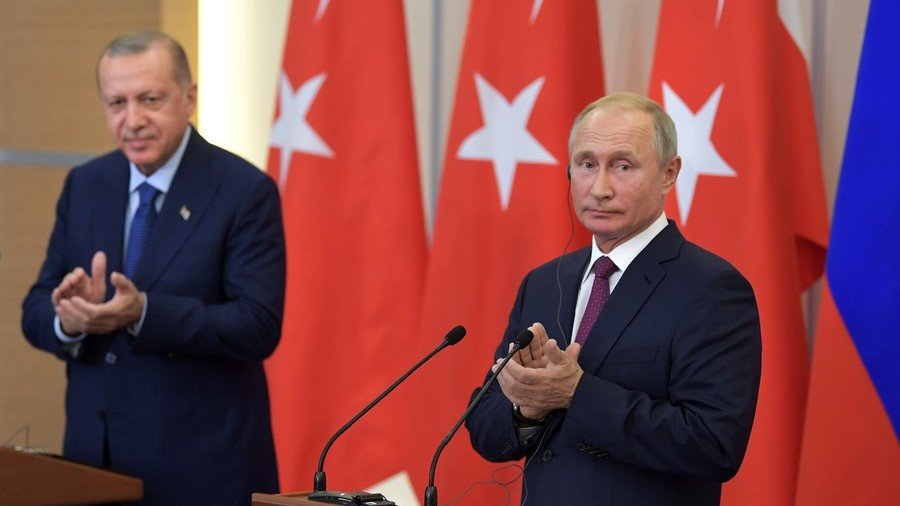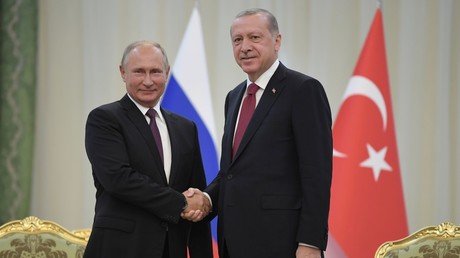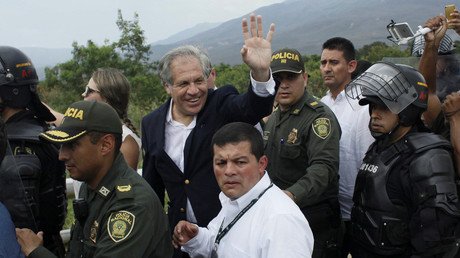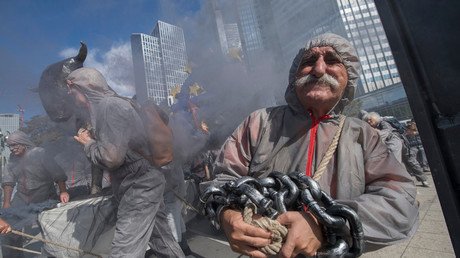Putin & Erdogan agree Idlib buffer zone to avert new Syria crisis

Russia and Turkey have agreed a “demilitarized zone” between militants and government troops in Syria’s Idlib, President Vladimir Putin said after hours-long talks with Turkey’s Recep Tayyip Erdogan focused on solving the crisis.
“We’ve focused on the situation in the province of Idlib, considering presence of large militant groups and their infrastructure there,” Putin said at a press conference after the talks.
“We’ve agreed to create a demilitarized zone between the government troops and militants before October 15. The zone will be 15-20km wide, with full withdrawal of hardline militants from there, including the Jabhat Al-Nusra.”
As part of solving the deadlock, all heavy weaponry, including tanks and artillery, will be withdrawn from the zone before October 10, Putin said. The zone will be patrolled by Turkish and Russian military units.
Before the end of the year, roads between Aleppo and Hama, and Aleppo and Latakia must be reopened for transit traffic, he said.
The agreement has received “general support” from the Syrian government, according to Putin.
The deal and other issues of Russian-Turkish ties apparently took almost 5 hours to hammer out. In what appears to a breakthrough solution, Putin and Erdogan have agreed to ensure peace with the help of Russian and Turkish troops.
“The territory controlled by the Syrian opposition must be demilitarized and the Syrian opposition that is holding these territories will remain there. But together with Russia we will make efforts to clear these territories of radical elements,” Erdogan said.
The agreement is designed to prevent a new “humanitarian crisis” in Syria, Erdogan stressed, and will help Turkey to avoid an even more “difficult situation.” He had previously warned of a surge in refugees hitting the country should a full-blown war break out in Idlib.
The plan is major landmark for Syria, where the standoff in the last militant stronghold of Idlib has threatened to turn into a major international crisis in recent weeks. The US and other NATO countries backing anti-government forces had repeatedly warned Russia and Syria not to launch any new offensive in the region. US President Donald Trump tweeted earlier this month that to do so would be a “grave humanitarian error,” while US envoy to the UN Nikki Haley outright said that any Russian attack on Idlib would provoke “dire” consequences.
About 70 percent of Idlib province is controlled by various terrorist factions, including Al Qaeda’s Syria affiliate Hayat Tahrir al-Sham (formerly known as the Al-Nusra Front), according to the Russian military. At the same time, both Turkey and the West support various militant groups they consider as “moderate” opposition to Syrian President Bashar Assad’s forces.
This turned out to be a dilemma for Ankara, with Turkish president simultaneously worried about Russia and Syrian action weakening the rebel groups, but also having concerns over the spread of terrorists and the potential influx of new refugees into areas bordering Turkey.
Now it appears that despite the rocky last few years of Russian-Turkish relations, the mutual trust built up between Putin and Erdogan has allowed them to overcome a clash of interests and reach a compromise.
Subscribe to RT newsletter to get stories the mainstream media won’t tell you.














